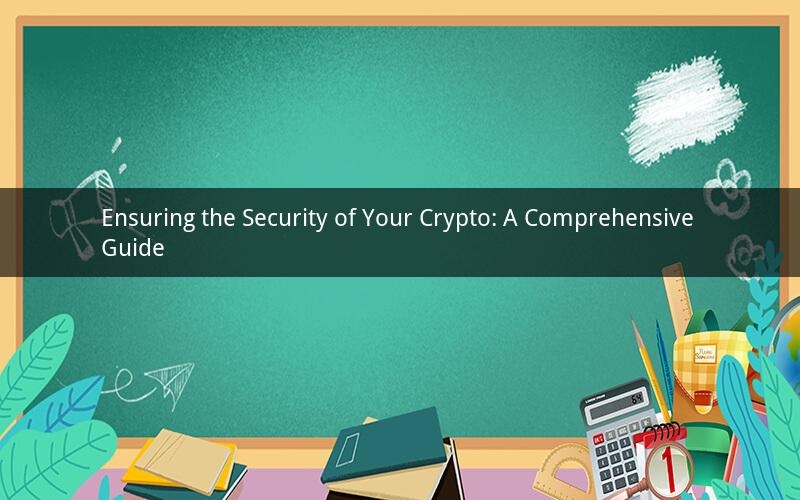
In an era where digital currencies are becoming increasingly popular, the importance of keeping your crypto safe cannot be overstated. Whether you are a seasoned investor or a beginner, understanding how to protect your digital assets is crucial. This guide will provide you with essential tips and best practices to ensure the security of your crypto.
1. Use a Strong Password and Two-Factor Authentication
The first step in securing your crypto is to create a strong, unique password for your digital wallet. Avoid using easily guessable information such as birthdays, names, or common words. Instead, opt for a combination of letters, numbers, and special characters. Additionally, enable two-factor authentication (2FA) to add an extra layer of security.
2. Choose a Secure Wallet
When it comes to storing your crypto, there are two main types of wallets: hot wallets and cold wallets. Hot wallets are connected to the internet and offer convenience, but they are more susceptible to hacking. Cold wallets, on the other hand, are offline and provide a higher level of security.
For everyday transactions, a hot wallet like MetaMask or MyEtherWallet can be sufficient. However, for long-term storage, consider using a cold wallet like Ledger or Trezor. These wallets are designed to store large amounts of crypto and are more secure than hot wallets.
3. Keep Your Software Updated
Software vulnerabilities are a common target for hackers. To minimize the risk of a security breach, ensure that your digital wallet and operating system are always up to date. Regularly check for updates and apply them promptly.
4. Be Wary of Phishing Attempts
Phishing is a type of cyber attack where hackers attempt to steal your sensitive information, such as passwords and private keys. Be cautious of emails, messages, or calls that request your personal information or direct you to click on suspicious links. Always verify the sender's identity before providing any sensitive information.
5. Backup Your Wallet
Regularly backup your digital wallet to prevent data loss. Most wallets offer a backup feature that allows you to export your private keys and import them into a new wallet. Store your backup in a secure location, such as an encrypted USB drive or a physical copy in a safe deposit box.
6. Avoid Public Wi-Fi Networks
Public Wi-Fi networks are often unsecured and can be easily exploited by hackers. Avoid accessing your digital wallet or making transactions while connected to a public Wi-Fi network. If you must use a public network, consider using a VPN to encrypt your data.
7. Use a Secure Browser
When accessing your digital wallet or crypto exchanges, use a secure browser like Brave or Tor. These browsers offer enhanced privacy features and help protect your data from being intercepted by malicious actors.
8. Educate Yourself on Security Best Practices
Stay informed about the latest security threats and best practices in the crypto world. Follow reputable sources, attend webinars, and read articles to keep up with the latest developments. This knowledge will help you make informed decisions and protect your assets.
9. Store Private Keys Securely
Your private keys are the digital equivalent of a key to your house. If someone gains access to your private keys, they can control your crypto. Store your private keys in a secure location, such as a hardware wallet or an encrypted text file. Never share your private keys with anyone.
10. Stay Vigilant
Lastly, always remain vigilant about the security of your crypto. Keep an eye on your wallet balance, monitor your transactions, and report any suspicious activity to your wallet provider or exchange.
Frequently Asked Questions:
1. What is a private key, and why is it important?
A private key is a unique code that gives you access to your crypto. It is crucial to keep your private key secure, as anyone who obtains it can control your assets.
2. Can I use the same password for multiple wallets?
No, it is essential to use a unique password for each wallet to minimize the risk of a security breach. Using the same password across multiple wallets increases the chances of a hacker gaining access to all your assets.
3. Are hardware wallets more secure than software wallets?
Yes, hardware wallets are generally more secure than software wallets. They store your private keys offline, making them less susceptible to hacking attempts.
4. How often should I backup my digital wallet?
It is recommended to backup your digital wallet regularly, especially if you store a significant amount of crypto. Backup your wallet at least once a month or after any significant transaction.
5. Can I recover my crypto if I lose my private key?
Losing your private key means losing access to your crypto. However, if you have a backup of your private key, you can recover your assets by importing the key into a new wallet.